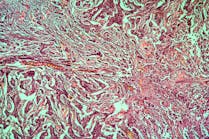A small feasibility study funded by the National Institutes of Health (NIH) found that an implanted device regulated by the body’s brain activity could provide continual and improved treatment for the symptoms of Parkinson’s disease (PD) in certain people with the disorder.
This type of treatment, called adaptive deep brain stimulation (aDBS), is an improvement on a technique that has been used for PD and other brain disorders for many years. The study found aDBS was markedly more effective at controlling PD symptoms compared to conventional DBS treatments.
Four people already receiving conventional DBS were first asked what they felt was their most bothersome symptom that had persisted despite treatment. In many instances this was either involuntary movements or difficulty in initiating movement. The participants were then set up to receive aDBS treatment alongside their existing DBS therapy. After training the aDBS algorithm for several months, the participants were sent home, where the comparison test was performed by alternating between conventional and aDBS treatments. Changes occurred every two to seven days.
aDBS improved each participant’s most bothersome symptom roughly 50% compared to conventional DBS. Notably, even though they were not told which type of treatment they were receiving at any one time, three of the four participants were often able to correctly guess when they were on aDBS due to noticeable symptom improvement.





